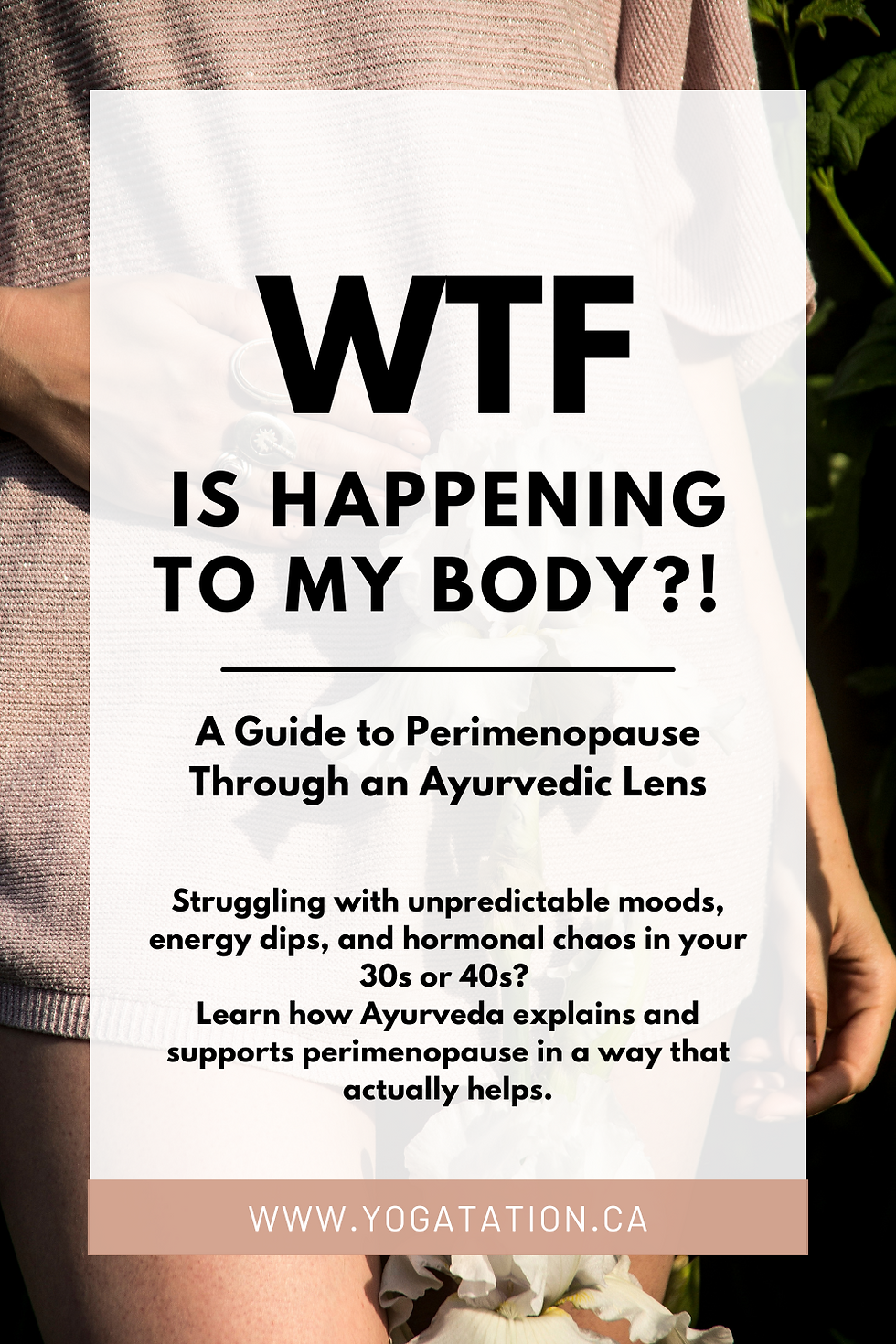WTF Is Happening to My Body?! A Guide to Perimenopause Through an Ayurvedic Lens | Yogatation
- Yogatation
- Jul 24, 2025
- 3 min read
If you’ve been asking yourself, “WTF is happening to my body?”—you’re not alone.
You might be in your mid-30s or early 40s, and suddenly things feel... off. Your periods shift. Sleep gets weird. You feel tired but wired, foggy but anxious. You want to scream and cry but also isolate. You’re not broken. You’re likely in perimenopause, the hormonal transition before menopause.

And while most Western approaches shrug and say "it's just hormones," Ayurveda actually gives us a beautiful, supportive roadmap.
What Is Perimenopause? (And Why No One Talks About It)
Perimenopause is the transitional phase leading up to menopause—and it can start as early as your 30s. Your hormones, especially estrogen and progesterone, begin to fluctuate wildly, affecting everything from mood and metabolism to skin and sleep.
Symptoms can include:
Irregular periods
Hot flashes
Anxiety or depression
Insomnia
Fatigue or burnout
Bloating and digestive issues
Yet so many women feel dismissed. That’s where Ayurveda can change the game.
My Personal WTF Moment (and Why I Turned to Ayurveda)
I didn’t even know I was in perimenopause until I felt completely unraveled. I had painful cycles, crashing energy, and mood swings I couldn’t explain. I blamed burnout. But deep down, I knew something hormonal was happening.
Ayurveda helped me see myself again—and then support myself with compassion and consistency.
The Ayurvedic View of Hormonal Shifts in Midlife
In Ayurveda, perimenopause is viewed through the lens of Vata energy. Vata governs change, movement, and the nervous system. As we age, Vata naturally increases—especially in perimenopause.
This is why we feel:
Unstable
Restless
Anxious
Dry (skin, joints, digestion)
Unanchored from our identity
Balancing Vata becomes key during perimenopause. Think: warmth, grounding, routine, oil, rest.
Dosha Imbalances in Perimenopause (and What to Do)
Each woman experiences perimenopause uniquely, depending on her constitution.
Vata Imbalance: anxiety, dryness, insomnia, irregular cycles
Pitta Imbalance: anger, hot flashes, irritability, heavy bleeding
Kapha Imbalance: weight gain, sluggishness, depression
Ayurveda doesn’t just treat symptoms. It balances your whole system.
5 Daily Ayurvedic Rituals That Support Hormone Harmony
Warm Lemon Water: Stimulates digestion and flushes toxins.
Abhyanga (Self-Oil Massage): Calms the nervous system, supports lymphatic flow.
Early Bedtimes: In bed by 10 PM to support melatonin and cortisol rhythms.
Spiced Herbal Tea (Cumin-Coriander-Fennel): Supports digestion and hormone metabolism.
Grounding Meals: Warm, cooked foods with healthy fats to stabilize Vata.
Bonus: Somatic Healing Practices for Emotional Rollercoasters
Gentle breathwork (like 4-7-8 breathing)
Somatic tracking to notice sensations and shift energy
Slow movement or restorative yoga to regulate your nervous system
Ready to Feel Like Yourself Again?
This is not the end. It’s the beginning of your next chapter. Perimenopause is a rite of passage. And with the right support, you can feel more connected, embodied, and powerful than ever before.
Want personalized support? Book a free 15 min consult for my Ayurvedic Hormone Healing sessions.
Love & Light,
Tal xo
Join our community today and unlock exclusive insights, tips, and offers that you won't want to miss—sign up for our newsletter now!
*Disclaimer: This Disclaimer forms a binding agreement between you and Tal Spooner also known as Yogatation, a Sole Proprietorship operating out of Ontario, Canada. In continuing to watch this video, read this blog and practicing yoga with me, you release me from any liability related to any injuries or issues which may arise from the risks of practicing yoga through this video. YOU ARE RESPONSIBLE FOR YOUR OWN ACTIONS IN PARTICIPATING IN THIS YOGA CLASS. These videos and blogs are posted for educational and informational purposes only and are not tailored to you specifically in any way. Please ensure you are practicing in a safe space and consult a medical professional before your practice. Lastly, please note that the techniques and approaches to yoga contained in these videos are simply my teachings and I make no representations about their efficacy nor do I promise any results.
Namaste and enjoy the practice.



Comments